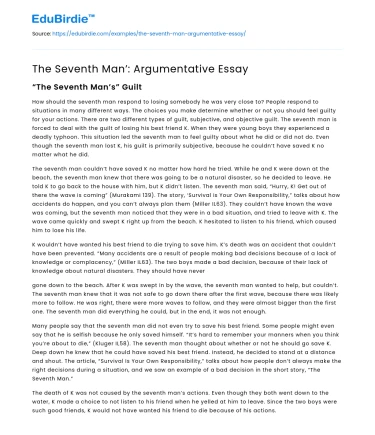“The Seventh Man’s” Guilt
How should the seventh man respond to losing somebody he was very close to? People respond to situations in many different ways. The choices you make determine whether or not you should feel guilty for your actions. There are two different types of guilt, subjective, and objective guilt. The seventh man is forced to deal with the guilt of losing his best friend K. When they were young boys they experienced a deadly typhoon. This situation led the seventh man to feel guilty about what he did or did not do. Even though the seventh man lost K, his guilt is primarily subjective, because he couldn’t have saved K no matter what he did.
The seventh man couldn’t have saved K no matter how hard he tried. While he and K were down at the beach, the seventh man knew that there was going to be a natural disaster, so he decided to leave. He told K to go back to the house with him, but K didn’t listen. The seventh man said, “Hurry, K! Get out of there the wave is coming” (Murakami 139). The story, ‘Survival is Your Own Responsibility,” talks about how accidents do happen, and you can’t always plan them (Miller IL63). They couldn’t have known the wave was coming, but the seventh man noticed that they were in a bad situation, and tried to leave with K. The wave came quickly and swept K right up from the beach. K hesitated to listen to his friend, which caused him to lose his life.
Save your time!
We can take care of your essay
- Proper editing and formatting
- Free revision, title page, and bibliography
- Flexible prices and money-back guarantee
K wouldn’t have wanted his best friend to die trying to save him. K’s death was an accident that couldn’t have been prevented. “Many accidents are a result of people making bad decisions because of a lack of knowledge or complacency,” (Miller IL63). The two boys made a bad decision, because of their lack of knowledge about natural disasters. They should have never
gone down to the beach. After K was swept in by the wave, the seventh man wanted to help, but couldn’t. The seventh man knew that it was not safe to go down there after the first wave, because there was likely more to follow. He was right, there were more waves to follow, and they were almost bigger than the first one. The seventh man did everything he could, but in the end, it was not enough.
Many people say that the seventh man did not even try to save his best friend. Some people might even say that he is selfish because he only saved himself. “It’s hard to remember your manners when you think you’re about to die,” (Kluger IL58). The seventh man thought about whether or not he should go save K. Deep down he knew that he could have saved his best friend. Instead, he decided to stand at a distance and shout. The article, “Survival Is Your Own Responsibility,” talks about how people don’t always make the right decisions during a situation, and we saw an example of a bad decision in the short story, “The Seventh Man.”
The death of K was not caused by the seventh man’s actions. Even though they both went down to the water, K made a choice to not listen to his friend when he yelled at him to leave. Since the two boys were such good friends, K would not have wanted his friend to die because of his actions. The seventh man felt responsible for the death of his best friend even though there was nothing he could have done to help him. He was hurting for a while, but he knew that K would want him to be happy.
Works Cited
- Kluger, Jeffrey. “Titanic vs Lusitania: How People Behave in a Disaster.” My Perspectives English Language Arts: Grade 9, edited by Ernest Morrell et al., vol. 1, Pearson, 2017, pp. IL58–IL61.
- Miller, Daryl R. “Survival Is Your Own Responsibility.” My Perspectives English Language Arts: Grade 9, edited by Ernest Morrell, vol. 1, Pearson, 2017, pp. IL62–IL65.
- Morrell, Ernest, et al. editors. “The Cost of Survival.” My Perspectives English Language Arts: Grade 9, vol. 1, Pearson, 2017, pp. 126–127.
- Murakami, Haruki. “‘The Seventh Man.’” My Perspectives English Language Arts: Grade 9, edited by Ernest Morrell et al., vol. 1, Pearson, 2017, pp. 133–144.






 Stuck on your essay?
Stuck on your essay?

